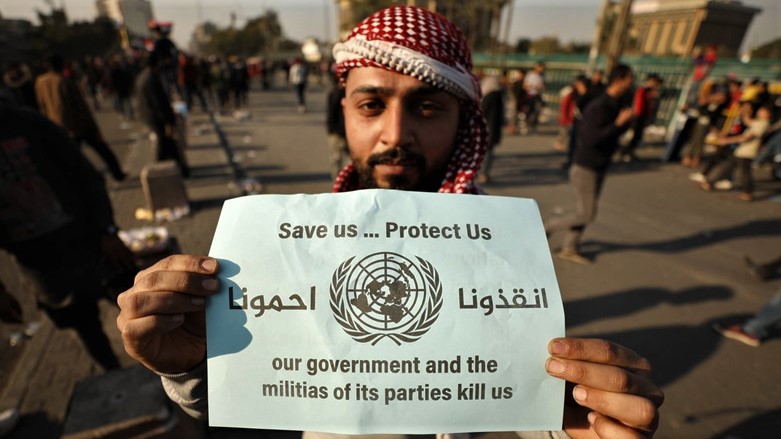UN calls for 'unidentified' militias to be held accountable for killing, torture of Iraqi protesters

ERBIL (Kurdistan 24) – The United Nations Assistance Mission for Iraq (UNAMI) has published a report on violations against Iraqi activists at the hands of "unidentified groups" over the past two years throughout the country that include assassinations, kidnappings, and torture.
The report, entitled "Accountability for Human Rights Violations and Abuses by Unidentified Armed Elements," includes testimonies of victims' families, a wide range of information surrounding large numbers of violent acts against those organizing and participating in a popular protest movement decrying institutional corruption, poor services, and a low standard of living.
Between Oct. 2019 and May 15, 2021, read the report, "UNAMI documented 48 incidents of attempted or completed targeted killings of protestors and critics" as part of incidents largely blamed on Iranian-backed militias of the Popular Mobilization Forces (PMF) that wield considerable military and political power in Iraq.
The report, in its own words, "focuses on the steps taken by the Iraqi authorities to ensure accountability for human rights violations and abuses linked to these demonstrations, in particular those attributed to 'unidentified armed elements' frequently referred to by victims and witnesses as 'militia.'"
UNAMI "defines 'unidentified armed elements' as armed actors not clearly identifiable as regular state security forces," though "may have various links to the state and/or political parties. The term 'militia,' it says, is "terminology commonly used in Iraq to describe armed groups operating outside state control."
Taken together, these are clear and unambiguous references to PMF militias.
“Allow me to be frank with you," said the father of one of the fallen victims to UN researchers. "We all know who the killers are, but do you think the authorities dare to mention their names? The Government knows exactly who the killers are, and they are affiliated to the political parties and the 'militia.' Do you expect me to believe that for one year and a half, the State cannot find the killers? They have all the authority and resources to do so."
International rights watchdog Human Rights Watch warned in mid-May about armed groups targeting journalists and activists, noting that failure to hold them accountable could cast a shadow over the upcoming Iraqi elections scheduled for October - two years after the start of protests - and spread a climate of fear among protesters who have called for change since October 2019.
Read More: Failure to hold armed groups accountable for killings will mar Iraq elections, HRW warns
The UNAMI report added that, although several arrests have been made in connection with the assassinations, none of them appears to have passed the "investigation stage" and pointed to "the near absence of convictions."
"UNAMI acknowledges the complex environment in which the Government operates, facing many challenges at once in
its pursuit of accountability, the report continued, appearing to acknowledge the difficult situation of Iraqi politicians and traditional security forces who, themselves, face threats from the PMF.
"Whilst the complexity is well understood, the pursuit of accountability must remain a priority. The lack thereof only emboldens the perpetrators and enables recurrence of serious abuses with impunity," the report concluded.
The protests prompted former Prime Minister Adil Abdul Mahdi to resign in December 2019, then succeeded by the current premiere, Mustafa al-Kadhimi, in May 2020.
After assuming his post, Kadhimi announced the formation of a committee publicly charged with revealing the circumstances of such violence, identify the perpetrators, and bringing them to justice.
"Despite the Government’s obligations to investigate and prosecute the perpetrators of suspicious deaths, enforced disappearance and torture, on multiple occasions UNAMI heard from both judicial sources, lawyers, and victims that cases had been closed or ‘waived’ based on the withdrawal of a complaint by victims."
"This is particularly pertinent in relation to demonstration-related cases attributed to 'unidentified armed elements,'" read the report, "where at least three families of those killed reported being pressured to 'waive cases' in return for 'blood money' or being threatened to withdraw complaints against certain armed actors."
On May 25, thousands of demonstrators took to the streets of Baghdad, calling for the killers of their comrades to be held accountable.
Read More: ‘Where’s my killer?’: Iraqis call for accountability in protesters’ deaths
Many gathered in the capital called to remove the administration of Prime Minister Kadhimi from power for not fulfilling its promises to find and punish those responsible for the deaths.
He began his term in May 2020 after his predecessor stepped down as a direct result of the widespread violence against the largely peaceful protesters.
Editing by John J. Catherine